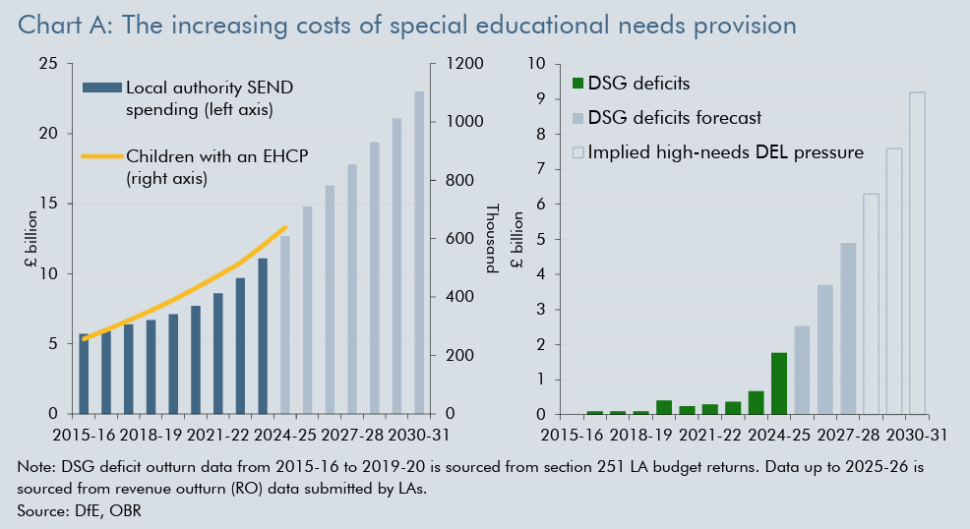Government plans to absorb the spiraling cost of SEND provision within central budgets will leave it facing a £6 billion annual shortfall, with no savings yet identified to meet it, the spending watchdog has warned.
The Office for Budgetary Responsibility said meeting the new pressure from 2028-29 from the core schools budget alone could see mainstream school funding fall by 1.7 per cent per pupil.
However, the government has not yet set out its plans to reform the system, nor how it will help councils address existing SEND deficits that are due to balloon to £14 billion.
Today the Treasury confirmed that “future funding implications will be managed within the overall government [spending] envelope, such that the government would not expect local authorities to need to fund future special educational needs costs from general funds, once the statutory override ends at the end of 2027-28”.
It means the future mounting cost pressures of the SEND system will sit on the government’s books, rather than councils.
Instead of councils continuing to set growing deficits, government would have to put more money into the system to address shortfalls.
Mainstream funding cut if pressure met from schools budget
In its Economic and fiscal outlook document, published before today’s budget in error but then released properly later on, the OBR said the decision to absorb the spending in central budgets was “estimated to cost £6.3 billion in 2028-29”.
But “no savings have been identified to offset the estimated £6 billion pressure” moving spending to central government will create.
The OBR originally reported that if this was fully funded within the Department for Education’s £69 billion core schools budget in 2028-29, “this would imply a 1.7 per cent real fall in mainstream school spending per pupil rather than the 2.4 per cent increase planned by government”.
It later corrected this and said the cut would be 4.9 per cent, as opposed to a 0.5 per cent increase.
The Treasury’s document refers to government budgets overall, not the DfE or core schools budget, and the department reiterated in response to the OBR report that the pressure would be absorbed across government.
The OBR estimates that, based on current SEND policy, this pressure “is forecast to reach £9 billion by 2030-31”. Overall, local authority SEND spending is due to rise from around £15 billion this year to around £22 billion in 2030-31.

‘Don’t cut school cash’ warn leaders
Natalie Perera, chief executive of the Education Policy Institute, warned that while there was a “clear and imminent need to address the rising costs of SEND provision, the government must not cut school funding to meet these pressures.
“Schools are only just emerging from a decade of real-terms cuts and the impact of the covid-19 pandemic.
“Further cuts to per-pupil funding risk widening inequalities and compromising schools’ ability to deliver a world-class education, particularly for disadvantaged and vulnerable pupils.”
And Pepe Di’Iasio, general secretary of the ASCL leaders’ union, said his organisation was “very concerned” by the warnings of a 1.7 per cent per-pupil funding cut.
“This would clearly have a catastrophic impact on educational provision and it is imperative that the government sets out how it intends to address this issue as a matter of urgency.”
A DfE spokesperson said it was “incorrect” for the OBR to say the pressure may be absorbed by the core schools budget.
“We are clear that any deficit will be absorbed within the overall government budget. These projections also do not account for the much-needed SEND reforms this government will bring forward.
“We inherited a SEND system on its knees and our changes will make sure children get support at the earliest stage, while bringing about financial sustainability for councils.”
Government silent on estimated £14bn historic deficits
The OBR also warned government has not said how it would address the historic deficits being racked up by councils, which could reach £14 billion by the time the override ends in 2028 and pose a “significant fiscal risk”.
The DfE is due to publish its proposed SEND reforms in a schools white paper in January.
The OBR said under the government’s current proposal, councils “would not build up further DSG deficits from 2028-29”.
But based on current policy, councils would then be “required to recognise the historic DSG deficits” on their balance sheets – when the override expires. The deficits are expected to reach £14 billion by then.
The OBR said: “This would be very likely to result in many local authorities issuing section 114s” – effectively declaring bankruptcy – due to “being unable to set a balanced budget.
“The fiscal impact of this would depend on how central government and individual LAs respond.”
The OBR added that government “has not set out how it will address this issue other than to state that its policy position is to work with local authorities to manage their SEND deficits and that it will set out more detail at the provisional Local Government Finance Settlement in December 2025.”
The OBR said the override has “masked but not resolved” pressures on SEND spending.














Your thoughts